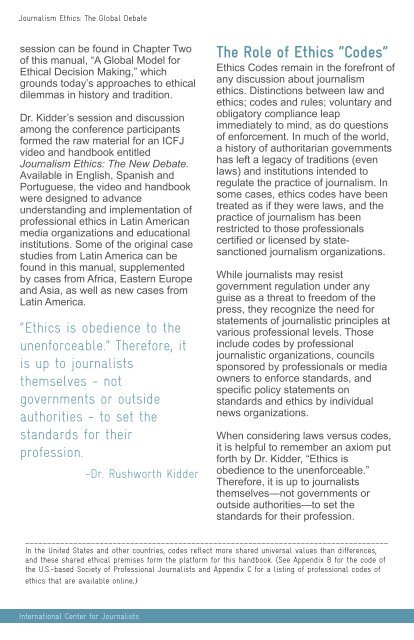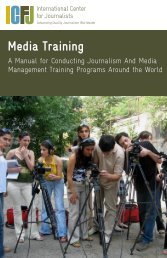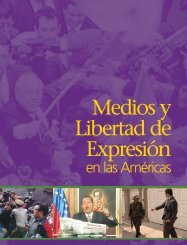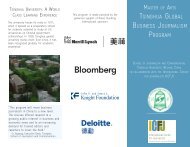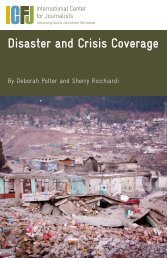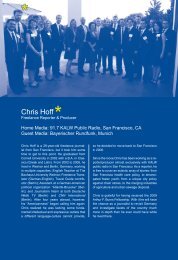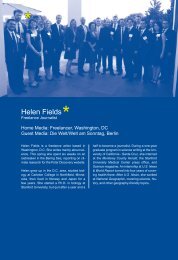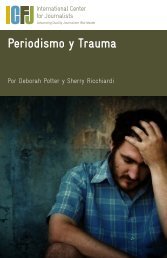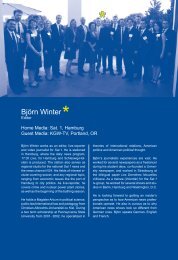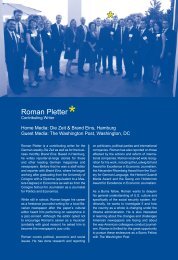Download PDF - International Center for Journalists
Download PDF - International Center for Journalists
Download PDF - International Center for Journalists
Create successful ePaper yourself
Turn your PDF publications into a flip-book with our unique Google optimized e-Paper software.
Journalism Ethics: The Global Debate<br />
session can be found in Chapter Two<br />
of this manual, “A Global Model <strong>for</strong><br />
Ethical Decision Making,” which<br />
grounds today’s approaches to ethical<br />
dilemmas in history and tradition.<br />
Dr. Kidder’s session and discussion<br />
among the conference participants<br />
<strong>for</strong>med the raw material <strong>for</strong> an ICFJ<br />
video and handbook entitled<br />
Journalism Ethics: The New Debate.<br />
Available in English, Spanish and<br />
Portuguese, the video and handbook<br />
were designed to advance<br />
understanding and implementation of<br />
professional ethics in Latin American<br />
media organizations and educational<br />
institutions. Some of the original case<br />
studies from Latin America can be<br />
found in this manual, supplemented<br />
by cases from Africa, Eastern Europe<br />
and Asia, as well as new cases from<br />
Latin America.<br />
“Ethics is obedience to the<br />
unen<strong>for</strong>ceable.” There<strong>for</strong>e, it<br />
is up to journalists<br />
themselves - not<br />
governments or outside<br />
authorities - to set the<br />
standards <strong>for</strong> their<br />
profession.<br />
-Dr. Rushworth Kidder<br />
The Role of Ethics “Codes”<br />
Ethics Codes remain in the <strong>for</strong>efront of<br />
any discussion about journalism<br />
ethics. Distinctions between law and<br />
ethics; codes and rules; voluntary and<br />
obligatory compliance leap<br />
immediately to mind, as do questions<br />
of en<strong>for</strong>cement. In much of the world,<br />
a history of authoritarian governments<br />
has left a legacy of traditions (even<br />
laws) and institutions intended to<br />
regulate the practice of journalism. In<br />
some cases, ethics codes have been<br />
treated as if they were laws, and the<br />
practice of journalism has been<br />
restricted to those professionals<br />
certified or licensed by statesanctioned<br />
journalism organizations.<br />
While journalists may resist<br />
government regulation under any<br />
guise as a threat to freedom of the<br />
press, they recognize the need <strong>for</strong><br />
statements of journalistic principles at<br />
various professional levels. Those<br />
include codes by professional<br />
journalistic organizations, councils<br />
sponsored by professionals or media<br />
owners to en<strong>for</strong>ce standards, and<br />
specific policy statements on<br />
standards and ethics by individual<br />
news organizations.<br />
When considering laws versus codes,<br />
it is helpful to remember an axiom put<br />
<strong>for</strong>th by Dr. Kidder, “Ethics is<br />
obedience to the unen<strong>for</strong>ceable.”<br />
There<strong>for</strong>e, it is up to journalists<br />
themselves—not governments or<br />
outside authorities—to set the<br />
standards <strong>for</strong> their profession.<br />
___________________________________________________________________________________<br />
In the United States and other countries, codes reflect more shared universal values than differences,<br />
and these shared ethical premises <strong>for</strong>m the plat<strong>for</strong>m <strong>for</strong> this handbook. (See Appendix B <strong>for</strong> the code of<br />
the U.S.-based Society of Professional <strong>Journalists</strong> and Appendix C <strong>for</strong> a listing of professional codes of<br />
ethics that are available online.)<br />
<strong>International</strong> <strong>Center</strong> <strong>for</strong> <strong>Journalists</strong>


